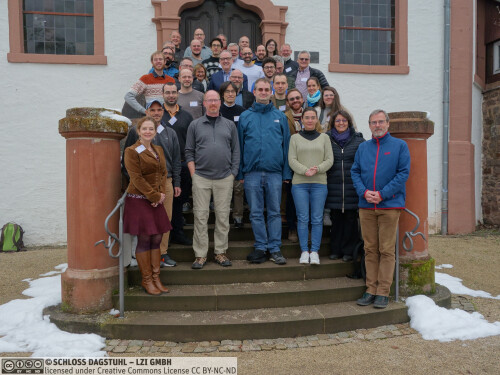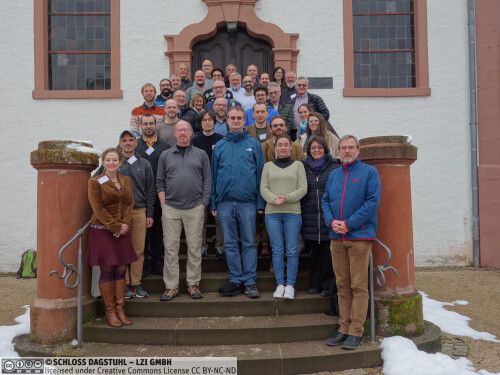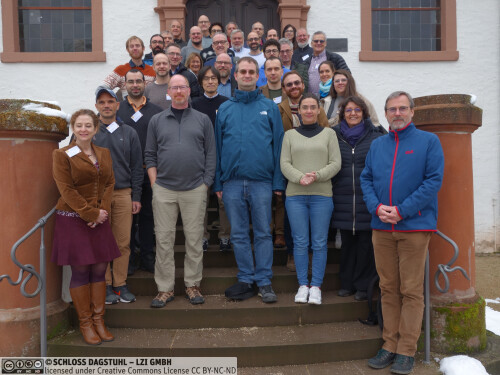Dagstuhl-Seminar 23041
Integrated Rigorous Analysis in Cyber-Physical Systems Engineering
( 22. Jan – 27. Jan, 2023 )
Permalink
Organisatoren
- Erika Abraham (RWTH Aachen University, DE)
- Stefan Hallerstede (Aarhus University, DK)
- John Hatcliff (Kansas State University - Manhattan, US)
- Danielle Stewart (Galois - Minneapolis, US)
Kontakt
- Andreas Dolzmann (für wissenschaftliche Fragen)
- Jutka Gasiorowski (für administrative Fragen)
Dagstuhl Seminar Wiki
- Dagstuhl Seminar Wiki (Use personal credentials as created in DOOR to log in)
Programm
Overview
The design of cyber-physical systems (CPSs) typically balances requirements that concern function, performance and interaction between discrete and continuous subsystems. In the big picture CPS design must be considered in the context of systems engineering. When engineering a CPS, modelling plays a central role during early stages of the development. Depending on objectives and purpose different models are produced, say, for a concept of operation, a trade study, a preliminary design, and a detailed design. In recent years modelling methods and tools have been developed that can contribute to the development of CPSs. Each method has a limited view of CPS development, say, focusing on correctness verification, scenario validation or evaluation of design alternatives. Each method is specialised on specific kinds of analyses depending on its purpose and objectives. Of course, this is necessary for reasons of effectiveness and efficiency. Unfortunately, then the outcomes of different analyses carried out on the various models of a CPS are not systematically exploited in the other models. The arguments connecting the different outcomes of independent methods and tools can be intricate and complex, potentially causing erroneous reasoning but missed opportunities when relevant outcomes remain unused.
This Dagstuhl Seminar explored systems engineering processes and methodology as a framework for rigorous reasoning to alleviate the problem of bridging different modelling methods, opening up a possibility to reason across method and stage barriers. The seminar brought together academic and industry representations from a variety of domains with backgrounds in different techniques. We developed a roadmap for addressing CPS challenges both in industry and academia, and identified ways that we can help each other overcome these challenges.
Outcomes of the Seminar
- Identified new techniques, tool capabilities and methodology improvements that will improve the ability to develop, assure, deploy, and evolve modern CPS.
- Identified gaps and needs that enumerates desired tool capabilities and methodology improvements that if successfully addressed, would improve the ability to develop, assure, deploy, and evolve modern CPS.
- Identified criteria and resources for community-based example systems that enable the interplay of multiple techniques to be evaluated across the life-cycle of system development.
- Created an activity plan for future meetings and smaller collaborative groups to build on the outcomes of the seminar.
The organizers thank all participants for their interesting ideas and viewpoints presented in talks, discussions, and informal meetings. Moreover, we would like to express our gratitude towards Schloss Dagstuhl and its staff for all the support before and during the seminar, which contributed to making this seminar a successful one.
 Erika Abraham, Stefan Hallerstede, John Hatcliff, and Danielle Stewart
Erika Abraham, Stefan Hallerstede, John Hatcliff, and Danielle Stewart
Over the past twenty years, the research community has made significant advances in methods for modelling CPSs and in engineering systems that include both discrete and continuous dimensions while permitting execution or simulation of involved CPS models. Researchers can now model, analyze, specify, and verify important properties of CPS with a broad array of tools, methodologies, and formalisms. Unfortunately, these valuable results of the research community are still not reaching their potential in industrial practice. Moreover, within academia, remaining challenges are not being exposed and framed in a way that catalyzes community research efforts.
An overarching theme of this Dagstuhl Seminar will be the potential use of integrated models and associated methodologies that support cross-technique information/results sharing and smooth workflow hand-offs between individual tools and methods. Rigorous systems analysis research is carried out in different communities that focus on specific aspects of analysis. Collaborations are more ad-hoc than strategic, although there is a continual need to combine different techniques and methods. We identify three large communities where the separation is more pronounced. (1) Verification techniques, (2) Simulation, visualization, and testing, and (3) Quantitative techniques and (intelligent) control. To overcome the separation a framework of concepts and workflows is needed. Here, systems engineering will serve as the basis for identifying potential information flow and synergies between different kinds of modelling and analysis. Systems engineering deals with the entire life-cycle of a system and moves the focus from specialized isolated tasks in system development to long-term considerations.
The strategy for engagement and work at the seminar should involve seeding the discussions with longer vision-oriented talks from key industry and academic leaders, followed by shorter talks and brain-storming sessions to collect material for a needs analysis. After aiming for breadth with these initial activities, the schedule will be oriented to explore in depth selected ideas related to challenge problems, community examples, and activities. Specific interest in particular areas will likely emerge based on the final list of participants and the dynamics of the meeting. Closer to the meeting time, we will identify exemplar resources and potential overview talks that will help seed discussions. To support the overarching theme of integrated models and methodologies, the seminar will seek to develop a better understanding of how the different techniques and methods can be better situated in the context of system engineering processes and how rigorous system analyses already understood by the participants can be better integrated and cross-leveraged.
The different rigorous analysis techniques differ in their objectives and their outcomes which are usually not connected. This Dagstuhl Seminar aims for bringing together academic and industrial experts from different fields and sectors to create discussions to encourage thinking across boundaries motivated by industrial needs. This continued awareness of the big picture is the main outcome of the seminar. Research work needs to be very focused to produce academically relevant new results but needs to be placed in a broad engineering context to permit application in industrial application. This is challenging and requires permanent attention considering strategic research objectives.
 Erika Abraham, Stefan Hallerstede, John Hatcliff, and Danielle Stewaart
Erika Abraham, Stefan Hallerstede, John Hatcliff, and Danielle Stewaart
- Noah Abou El Wafa (KIT - Karlsruher Institut für Technologie, DE)
- Erika Abraham (RWTH Aachen University, DE) [dblp]
- Wolfgang Ahrendt (Chalmers University of Technology - Göteborg, SE) [dblp]
- Stanley Bak (Stony Brook University, US) [dblp]
- Ezio Bartocci (TU Wien, AT) [dblp]
- Stylianos Basagiannis (Raytheon Technologies - Collins Aerospace - Cork, IE) [dblp]
- Andrea Bombarda (University of Bergamo - Dalmine, IT)
- Borzoo Bonakdarpour (Michigan State University - East Lansing, US) [dblp]
- Joanna Delicaris (Universität Münster, DE) [dblp]
- Leo Freitas (Newcastle University, GB) [dblp]
- Cláudio Gomes (Aarhus University, DK) [dblp]
- Stefan Hallerstede (Aarhus University, DK) [dblp]
- Simon Thrane Hansen (Aarhus University, DK) [dblp]
- David Hardin (Collins Aerospace - Cedar Rapids, US) [dblp]
- John Hatcliff (Kansas State University - Manhattan, US) [dblp]
- Fuyuki Ishikawa (National Institute of Informatics - Tokyo, JP) [dblp]
- Nils Jansen (Radboud University Nijmegen, NL) [dblp]
- Einar Broch Johnsen (University of Oslo, NO) [dblp]
- Gabor Karsai (Vanderbilt University, US) [dblp]
- Joseph Roland Kiniry (Galois - Portland, US) [dblp]
- Klaus Kristensen (Bang & Olufsen - Struer, DK) [dblp]
- Régine Laleau (IUT Sénart-Fontainebleau, FR) [dblp]
- Peter Gorm Larsen (Aarhus University, DK) [dblp]
- Thierry Lecomte (CLEARSY - Aix-en-Provence, FR) [dblp]
- Michael Leuschel (Heinrich-Heine-Universität Düsseldorf, DE) [dblp]
- Paolo Masci (NASA Langley - Hampton, US) [dblp]
- Monica Moniz (Cambridge University Press, GB)
- Andrei Munteanu (Siemens PLM Software, BE)
- Ken Pierce (Newcastle University, GB)
- André Platzer (KIT - Karlsruher Institut für Technologie, DE) [dblp]
- Anne Remke (Universität Münster, DE) [dblp]
- Kristin Yvonne Rozier (Iowa State University - Ames, US) [dblp]
- Maike Schwammberger (KIT - Karlsruher Institut für Technologie, DE) [dblp]
- William Earl Scott III (ScubaTx - Newcatle upon Tyne, GB & Newcastle University, GB)
- Marjan Sirjani (Mälardalen University - Västerås, SE) [dblp]
- Danielle Stewart (Galois - Minneapolis, US) [dblp]
- Alan Wassyng (McMaster University - Hamilton, CA) [dblp]
- James C. P. Woodcock (University of York, GB) [dblp]
- Frank Zeyda (Zapopan, MX)
Klassifikation
- Logic in Computer Science
- Software Engineering
- Systems and Control
Schlagworte
- Rigorous modelling and analysis
- Formal methods
- Cyber-physical systems
- Systems engineering




 Creative Commons BY 4.0
Creative Commons BY 4.0
